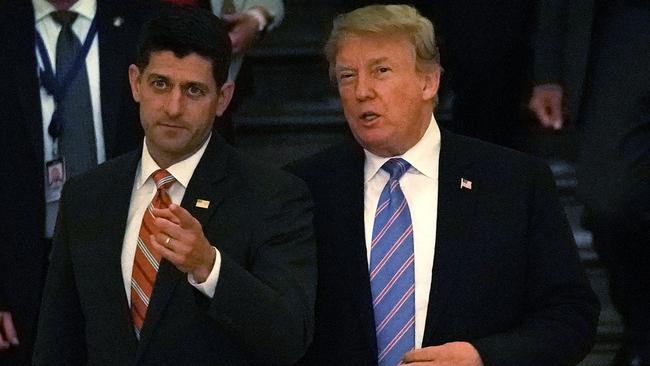
At the moment high iron ore prices mask a deep flaw in our corporate taxation system: enterprises like Google, Microsoft, Netflix, and Amazon are absorbing more and more national revenue but they do not pay tax in Australia.
Today’s commentary will describe a way to overcome the problem: cash flow taxation. This is a solution that was actually devised by none other than US Republican and former house speaker Paul Ryan. For a time it was endorsed by Donald Trump. President Trump then abandoned the idea, perhaps because if the system took off around the world the US giants would have less money to send back home. .
I was led to cash flow taxing because it is apparent that the future of Australian small business lending will be based on cash flow. So surely it makes sense to consider embracing the Ryan-Trump plan and tax companies on a cash flow basis.
That thought led me to a fascinating paper published last December entitled “Replacing corporate income tax with a cash flow tax”.
It was authored by University of Melbourne’s Ross Garnaut, former ALP trade minister Craig Emerson, the London School of Economics’ Reuben Finighan, and Industry Super Australia’s Stephen Anthony. While none of the above is close to the current government, this problem is recognised by both sides of politics. Our Australian Taxation Office has been engaged in global negotiations which seem to be betting nowhere. But on this occasion I am not critical of our ATO, because the US plays hard ball.
The French have imposed a 3 per cent turnover tax on digital multinationals with annual revenue of more than €750 million, of which at least €25m is generated in France.
Other European countries are considering a similar move. The US has responded by considering a big tariff on French wine exports to the US. We need to be smarter.
The cash flow paper says world business taxation is in a “state of crisis” because the 20th century corporate tax models are deeply flawed in 21st century conditions.
“A corporate taxation model for the 21st century has to take account of a number of realities: greater mobility of capital, giving rise to an international ‘race to the bottom’ in taxation rates to attract and retain investment; increasing international payments for management and intellectual property fees in deductions from assessable income; increasing opportunities for tax avoidance and evasion through transactions across international borders; an expansion in the proportion of rents and decline of competitive returns to capital in corporate income; a decline in the competitive position of national against multinational corporations arising out of the former’s more limited opportunities for tax avoidance and evasion; and a declining national tax compliance culture and growing resentment of “globalisation” arising out of multinational enterprises’ tax avoidance and evasion.
“Declining contributions of corporate taxation to national revenue have exacerbated inequality in after-tax income at a time when there is large community unhappiness at growing inequality in pre-tax incomes”, the cash flow taxing paper says.
Fairer corporate taxation is one area that can attract support from the Coalition, ALP and crossbenchers . Everyone recognises the problem.
So let’s detail how cash flow taxing might work.
- The cash flow tax would have as its base net cash flows, being taxable revenue less non-financing cash outlays, encompassing operating costs plus capital expenditure. Note that capital expenditure becomes tax deductible.
- As an offset, interest and other financing costs are non-deductible, except for finance organisations like banks. .
- The accounting data for revenues and expenditures would be exactly the same as for corporate income tax, and the petroleum resource rent tax, so that established case law would still apply.
- No deduction would be allowed for imported services, unless the transaction is at arm’s length and relates to current costs of goods and services directly applied to producing the service for which a deduction is claimed. This would deny a deduction for payments for imported intellectual property except to the extent that the service purchased has itself required direct expenditure on goods and services for Australia.
- Foreign owners of intellectual property can earn rent through Australian sales, but payments for it are not deductible against Australian cash flow, except to the extent that they require specific expenditure on adaptation to Australian conditions.
- For Australian investment in research and development, the tax treatment is highly encouraging because there is an immediate deduction of all expenditures.
- Franking credits remain
- There would be grandfathering provisions in the changeover.
The greatest revenue problem with the cash flow system is that in capital-intensive projects, net cash flows in the early years would be negative and with the grandfathering there might be some adverse taxation revenue implications. Also the current low interest rates lessen the tax benefit of not deducting interest. Nevertheless, the cash flow taxing paper estimates that because of the tax revenue generated from the US giants it will be possible to levy a lower corporate tax rate and maintain or increase revenue. But its authors admit it’s not a precise estimate.
What’s required is a study with access to detailed taxation statistics. The problem is that the large. accounting firms hate the idea, because a big slab of their revenue comes from their expertise in manipulating the current complex system. Cash flow taxation is too easy.
For similar reasons, the ATO hates the idea.
A decade ago you would not seriously consider change, but the need to restore fairness to the tax system is really important for cohesion in society. Making small business taxation fairer and stopping the ATO’s abuse of small business is important, but this issue is even more important.
The French “gilets jaunes” protests had many causes but the breakdown in corporate taxation fairness was an important driver. We need the US for defence, so we don’t want to start a trade war by adopting the French system. But Paul Ryan and Donald Trump showed us a way to restore fairness as well as encouraging business investment to lift productivity.



